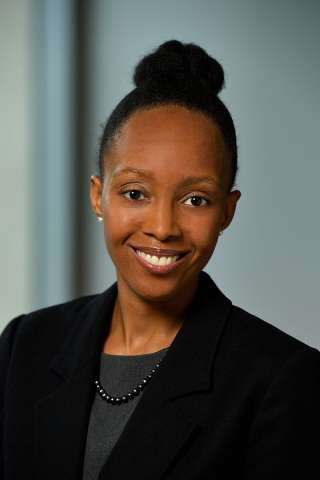
Q&A: Billina Shaw
October 25, 2019
With a medical degree already under her belt, Bloomberg Fellow Billina Shaw, M.D., has been working as a psychiatrist for more than five years. She joined Maryland’s Prince George’s County health department three years ago as the medical director of mental health services. She oversees the behavioral health clinic, which treats mental health conditions of people with substance-use disorders, a role that has shaped her view on how the nation should approach addiction. Beyond the clinic, Billina chairs the county’s drug overdose fatality review team, which investigates the details of deaths by overdose in the county. The team seeks to better understand the lives of the deceased so the county can develop effective interventions and prevent further overdose deaths.
Now, Billina’s interest in health disparities at the population level has brought her back to school to pursue a master’s at the Johns Hopkins Bloomberg School of Public Health. We talked to her about how schools, police departments and social service agencies could be enlisted to improve health; the connection between mental health and substance-use disorders; and how addiction is just one facet of people’s lives.
What is driving your shift to the public health sphere?
I first started to understand how different systems — such as schools, law enforcement, social services and even philanthropic groups — impacted health when I was working with children in Baltimore City during my fellowship in child and adolescent psychiatry at the University of Maryland Medical Center. But at the time, I didn’t know how to have an impact on that. Now, I want to see better coordination and collaboration between systems in our community. Law enforcement could be used to divert people with substance-use disorders to treatment rather than jail, social services could be used to support social determinants of health such as access to services and healthy food, and quality education could increase marginalized populations’ ability to enter and succeed in the work force which, in turn, improves public health outcomes. These efforts will create a community with better health.
How do mental-health and substance-use disorders overlap?
It’s often a cyclical relationship. Depression, which is the most common cause of disability worldwide, and anxiety are very common threads among people with substance-use disorders. If someone is not treating their depression or anxiety, they are sometimes self-medicating with drugs and/or alcohol, and that causes them to become more depressed or anxious. Traumatic experiences are also a common link between the two disorders. Studies show that most people who enter substance-use disorder treatment have experienced trauma in their lives. People often self-medicate to treat the trauma rather than dealing with the past, which increases their chances of experiencing further trauma. Another cycle I’ve witnessed is between parents with substance-use disorders and their children, and how the parent’s disorder impacts their kids’ mental health. Suicide is also an important factor of mental health to consider in relation to substance misuse. Suicide rates are greatly increasing in our country, and there’s a lot of research coming out now about how we might be undercounting the number of fatal overdoses that might instead be deaths by suicide. There’s a lot of overlap between the two disorders, which is why it’s so important to have a holistic, evidence-based approach to both.
What are you hoping to take away from your time at Bloomberg?
My goal is to take what I learn and be able to analyze population health risks in a more disciplined, analytical way in order to create effective public health programming in Prince George’s County. In this very addiction-focused climate, I want to understand people more holistically. Their deaths are about more than the fact that they died — it’s about the social, cultural, individual and family factors that got them to where they were. We can learn from that and prevent further deaths by more effectively treating people for their disorders.
Connect With Us
Receive all the latest news from the Initiative by signing up for the American Health Dispatch newsletter, subscribing to the American Health Podcast, and subscribing to our YouTube channel.
Contact Us